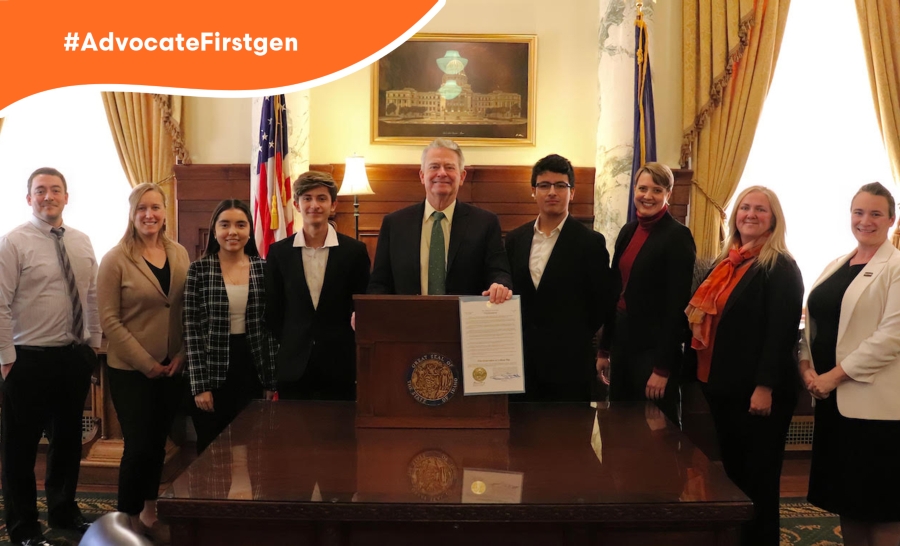FirstGen Forward announces new Network Leader institutions
Twenty new schools selected for commitment to advancing the success of first-generation students
FirstGen Forward / October 07, 2024

The #FirstGenForward community observes the First-Generation College Celebration (FGCC) annually on November 8 to commemorate the signing of the Higher Education Act of 1965 (HEA). Many of the act’s provisions, particularly the Federal TRIO programs, promote postsecondary access, retention, and completion for today’s first-generation students.
Raising awareness of the first-gen identity among key stakeholders, including policymakers and the media, is essential if we are to finish the work started by the HEA. We urge you to work with your governor to recognize November 8 as First-Generation College Celebration Day through a formal proclamation.
A proclamation is a public statement issued by a state’s governor to recognize and commemorate an event or cause of particular significance to the state’s citizens. Unlike legislation, proclamations do not have the force of law and do not require legislative approval. For this reason, governors can usually issue proclamations unilaterally and (relatively) quickly.
Despite their largely ceremonial nature, proclamations are valuable tools for raising awareness of events and causes among policymakers, the media, and the public. Proclamations are one way governors communicate their priorities to state legislators and influence policy agendas. To the extent first-gen champions can leverage proclamations to set the legislative agenda, they increase their opportunities to #AdvocateFirstGen.
Proclamations sometimes capture the media’s attention. They are most likely to do so when accompanied by a formal signing ceremony attended by key community stakeholders like the one Governor Brad Little (R-ID) organized when he recognized FGCC in 2023. In promoting the proclamation, reporters amplify its underlying cause further across the state. This positions the cause as a worthy subject of public debate and legislative action.
The proclamation request process differs across states. Moreover, established processes can change when new governors begin their terms. Regardless, the steps below reflect the general steps you can take to prepare a proclamation for your governor.
If you’re interested in pursuing a #CelebrateFirstGen proclamation, please contact us for additional information and we’d be happy to assist with your efforts.
All proclamation guidelines will appear on your governor’s website. Though the exact placement will vary from state to state, proclamation information typically appears under the headings “Constituent Services” or “Contact Us.”
Take special note of any guidelines addressing submission deadlines (including earliest date and latest date), eligible submitters (e.g. state residents), submission method (e.g. online form, email), required content (e.g. submitter contact information, event summary, number of “whereas” clauses), and prohibited content (e.g. political statements).
Institutional government affairs or external relations personnel have the expertise and connections necessary to aid in the successful submission and adoption of your proclamation. They know how to structure proclamations and which information, if included, is most likely to catch your governor’s attention. Once submitted, they can likely facilitate the proclamation’s consideration, and they may help to secure signing ceremony attendance for some of your first-gen students.
Engaging these professionals early is vital for ensuring your work aligns with broader institutional goals and priorities. Some states prohibit the same organization from submitting multiple proclamation requests within the same calendar year. By submitting your proclamation, you may undermine existing efforts to secure one for another institutional priority.
Most states require you to submit a draft of your proposed proclamation for consideration alongside your request form. Though states reserve the right to amend your proclamation, it’s important to consult with your government relations and external affairs teams to prepare the strongest draft possible that supports broader institutional goals and priorities. Most governors publish their proclamations’ full text on their websites. Be sure to review a few examples to learn the state’s required structure and some key elements to include.
Governors are more likely to issue proclamations aligned with events and causes of statewide significance. As such, you should include statewide data about the first-generation college student population in your proclamation whenever possible. FirstGen Forward has a wealth of data that may enhance your draft. Please contact us for more information and example proclamations.
Once drafted, share your proclamation with key stakeholders. Again, government relations, external affairs, and students can provide invaluable feedback to strengthen your proclamation and increase its adoption odds.
Ensure your proclamation includes all required elements and excludes any prohibited content identified in the proclamation guidelines on your governor’s website.
Return to your governor’s website and complete your state’s proclamation request form. Ensure you’re using an eligible submitter’s (i.e. a state resident’s) contact information to complete the form. Otherwise, the governor may reject your proclamation request without substantive review.
The governor’s staff will review your proclamation request and contact you once they render a decision. Offices receive a high volume of submissions, so expect response delays. Be sure to consult with your government affairs team before inquiring about the proclamation request’s status.
If the governor declines to adopt your proclamation, consider soliciting additional feedback, revising your submission, and resubmitting next calendar year!
Preparing a #CelebrateFirstGen proclamation is an excellent way to #AdvocateFirstGen leading up to the annual First-Generation College Celebration. Doing so encourages cross-functional collaboration, which helps to dismantle the silos that often impede first-gen student success efforts. It also provides an excellent opportunity for your students to develop the advocacy skills vital for their success in college and beyond.
If you’re interested in pursuing a #CelebrateFirstGen proclamation, please contact us for additional information, and we’d be happy to assist with your efforts.